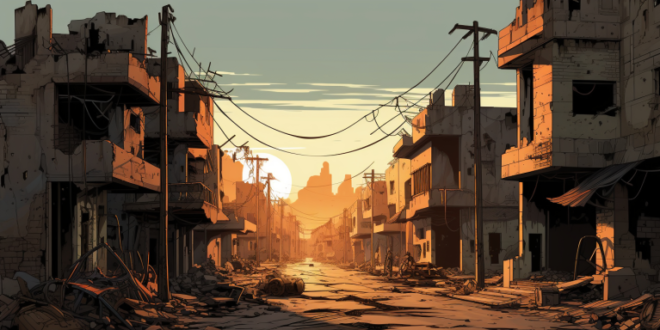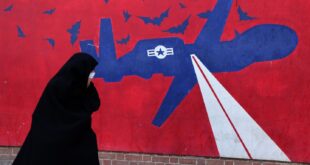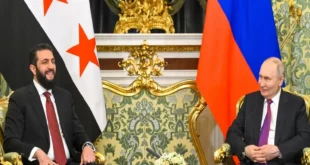A devastating attack by jihadists has left a trail of destruction and loss in northwestern Syria’s Idlib province. On Saturday, militants belonging to the Ansar al-Tawhid group and the Turkestan Islamic Party (TIP) carried out a coordinated assault that claimed the lives of at least 11 soldiers. According to reports from the Syrian Observatory for Human Rights, the attackers strategically detonated explosives placed in tunnels beneath army positions before launching a violent onslaught.
Rami Abdel Rahman, the head of the Britain-based Observatory, revealed the chilling details of the assault. “Detonating tunnels they had dug beneath army positions and simultaneously launching an assault from other tunnels,” Rahman stated, emphasizing the level of planning and coordination executed by the militants.Tragedy further befell the region as the attack left 20 soldiers wounded. The assault unfolded in the southern part of Idlib province, a zone that has seen ongoing military activity. Concurrently, Syria and its ally Russia have been conducting airstrikes in the mountainous Jabal al-Zawiya area of Idlib. While the observatory confirmed these airstrikes, immediate details regarding casualties have not yet been reported.
The attack’s collateral damage extended to civilian lives. The White Helmets, a volunteer emergency service, revealed that a brother and sister lost their lives when their home in the village of Kansafra was struck. Five other civilians were wounded in the same incident.
Affiliation with Hayat Tahrir al-Sham: Unveiling the Extremist Nexus
Notably, the jihadist groups responsible for the attack, Ansar al-Tawhid and the Turkestan Islamic Party, are affiliated with Hayat Tahrir al-Sham (HTS), a larger extremist organization controlling significant parts of Idlib province as well as neighboring regions. The HTS has been at the center of the ongoing conflict and has been linked to Al-Qaeda’s former affiliate in Syria.
The footage shows an airstrike by the Russian Aerospace Forces on the meeting location of the field commander of the "Hayat Tahrir al-Sham" (HTS) group and terrorists from the Islamic Party of Turkestan in Idlib.
As a result, seven people were killed and ten were injured. pic.twitter.com/f27G0fhBdd
— 301 Military (@301military) August 22, 2023Ansar al-Tawhid is an Islamist militant organization with a history of engagement in conflict zones, primarily in the Middle East. It was established in early 2018 by Abu Diyab al-Sarmini and is based in towns located in the eastern region of Idlib. Operating within the broader framework of jihadist ideologies, the group seeks to establish strict interpretations of Islamic governance and law. It has been involved in Syria’s civil war, where it has fought against government forces and other opposition factions. The organization is known for forming alliances with other extremist groups in pursuit of its objectives. These alliances have included groups such as Al-Qaeda and parts of the Hurras al-Din-led Rouse the Believers Operations Room until its departure in 2020, reflecting its broader commitment to the jihadist cause.
On the other hand, the TIP, also referred to as the Turkistan Islamic Movement (TIM), is an extremist organization founded by Uighur militants from China’s Xinjiang region. With its origins dating between the 1980s and 1990s, TIP aims to establish an independent Islamic state named “East Turkestan” in Xinjiang, which they view as oppressed by Chinese rule. Designated as a terrorist group by several countries, including China and the United States, TIP has been active in various conflict zones, including Afghanistan, Pakistan, and Syria. It has gained attention for participating in global jihadist movements and its role within the broader coalition, such as its alignment with Hayat Tahrir al-Sham (HTS) in Syria. The group’s activities have sparked concerns about the potential for Uighur militants to carry out attacks upon returning to China.
The Unfolding Tragedy: Syrian Civil War’s Human Toll and Complex Landscape
The war in Syria, which erupted in 2011, has led to the deaths of over 500,000 people and displaced around half of the country’s pre-war population. The conflict emerged from a confluence of factors, with the involvement of foreign powers and the influx of jihadists from abroad further complicating the situation. Political repression under the Assad regime prompted nationwide protests for reforms and rights, influenced by the Arab Spring movement. The government’s violent crackdown on peaceful demonstrations ignited armed resistance, leading to the rise of rebel factions like the Free Syrian Army. Russia intervened in 2015 to support President Bashar al-Assad’s government forces, shifting the dynamics of the conflict.
As the region grapples with the aftermath of this tragic incident, the death toll from the jihadist attack is expected to rise due to the ongoing intense clashes. The war monitor cautioned that “two jihadists took their own lives” during the attack, adding to the grim toll.
The rebel-held Idlib province, home to approximately three million people, has borne witness to the complexities of warfare and the plight of those displaced by the conflict. While a ceasefire agreement brokered by Russia and Turkey has been in place since 2020, sporadic clashes serve as a stark reminder of the fragility of the situation.
As the international community continues to grapple with the ongoing crisis in Syria, the recent attack underscores the challenges that persist and the human toll that conflict extracts from the region.
 Eurasia Press & News
Eurasia Press & News


